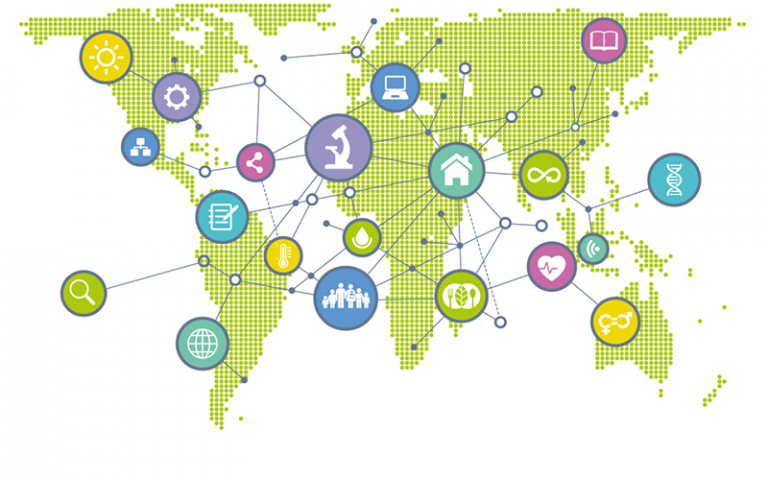Science, technology and innovation is not addressing world’s most urgent problems
20 October 2022
A major new study, led by the University of Sussex and UCL, has found that global science research serves the needs of the Global North and is driven by the values and interests of a small number of companies, governments and funding bodies.

The report, Changing directions: Steering science, technology and innovation for the Sustainable Development Goals, found that science, technology and innovation research is not focused on the world’s most pressing problems including taking climate action, addressing complex underlying social issues, tackling hunger and promoting good health and wellbeing. The authors found that research and innovation around the world is not focused on meeting the UN’s Sustainable Development Goals, which are a framework set up to address and drive change across all areas of social justice and environmental issues. Critically, the report finds that research in high-income and middle-income countries contributes disproportionally to a disconnect with the SDGs. Most published research (60%-80%) and innovation activity (95%-98%) is not related to the SDGs.
Illustrating the imbalance, the report found that 80% of SDG-related inventions in high-income countries were concentrated in just six of the 73 countries – with the United States alone developing 47 per cent of such inventions. In both the Global North and Global South — and across areas such as health, food or energy — research and innovation funds tend to be spent on technologies that benefit private interests, rather than on those that more directly address social and environmental problems. The research shows that most high-income countries do not prioritise research on the major environmental challenges associated with unsustainable consumption and production patterns.
The research also finds that, even though a majority of stakeholders consider social, policy and grassroots innovations critical to addressing the SDGs, support for these types and forms of innovations, and related research on complex underlying social issues of deprivation, inequality and conflict, lags far behind.
The study is an international collaboration led by the University of Sussex and supported by researchers from UCL STEaPP - Professor Joanna Chataway, Dr Ine Steenmans and Professor Sir Geoff Mulgan. Other collaborators include the UN Development Programme; the United Nations University; the National Scientific and Technical Research Council, Argentina; the Centre for Research on Innovation and Science Policy, India; Leiden University, The Netherlands; the Graduate School of Technology Management, South Africa; and Nesta, UK.
Haoliang Xu, UN Assistant Secretary General and Director of UNDP’s Bureau for Policy and Programme Support, said:
"The world is in turmoil. Profound economic, political, and ecological disruptions are threatening to derail the achievement of the sustainable development goals (SDGs). However, as this year’s Human Development Report puts it: “There is opportunity in uncertainty” – and this speaks directly to science, technology, and innovation (STI). We hope that the findings of this important report will contribute to the debate on readjusting the funding and governance architecture of STI for a step change in our efforts to reach the SDGs and leave no one behind."
The authors of the Steering Research and Innovation for Global Goals (STRINGS) project are urging science, technology and innovation to be made more democratic, and more closely aimed at achieving sustainability. This includes an increase in evidence and tools, such as those provided in the new STRINGS report, to enable more active debate and exploration of alternative and inclusive science, technology and innovation strategies.
Professor Joanna Chataway, Head of Department at UCL STEaPP said: “The report aims to address the imbalance that we are currently seeing. We are trying to steer science, technology and innovation work in the direction of the SDGs so we can meet global and economic challenges. It doesn’t happen automatically.”
Dr Ine Steenmans, Associate Professor in Futures, Analysis and Policy in UCL STEaPP, said: "The question of whether the outcomes of global research and innovation are contributing to achieving the UN's Sustainable Development Goals has been a huge challenge. What’s been so inspiring about the work that went into this study is that everyone stretched themselves beyond the contribution of an already incredibly rich and novel evidence base capturing the misalignments between science and the SDGs. The project has further developed a wide range of tools for empowering stakeholders, such as research funders, to better steer diverse science and innovation pathways towards more sustainable futures."
In brief, the report calls for:
- Increasing funding for SDG-related research and innovation, particularly in lower income countries, on underlying social issues, social policy and grassroot innovations, and research relevant to a region or context.
- Promoting a rich diversity of science, technology and innovation pathways to address specific SDG challenges, including social and organisational innovation.
- Designing accountable initiatives that strengthen science, technology and innovation governance and support open and inclusive processes of deliberation and prioritisation.
- Empowering stakeholders to form different interpretations of what counts as SDG-related science, technology and innovation.
Other recommendations from the report also include:
- Funding more research that explicitly investigates tensions and synergies between different aspects of sustainability, including providing greater support for interdisciplinary and Including LIC researchers and stakeholders in the advisory and management committees of funders, to ensure their views are considered in planning, defining and evaluating research agendas.
- Ensuring that decisions about which science, technology and innovation pathways to prioritize involve stakeholders affected by those decisions.
- Setting up a global platform observatory to conduct regular surveys of global research and development, its diversity, inclusion, scale, locations, purposes and impacts; bringing together constellations of funders; and creating global funding pools.
The STRINGS project was funded by UK Research and Innovation (UKRI).
Video
The STRINGS project team outline the research behind their findings, including case studies from Kenya, Argentina and India.
Links
- Changing directions: Steering science, technology and innovation for the Sustainable Development Goals
- STRINGS
- Professor Joanna Chataway research profile
- Dr Ine Steenmans research profile
- Professor Sir Geoff Mulgan research profile
 Close
Close

